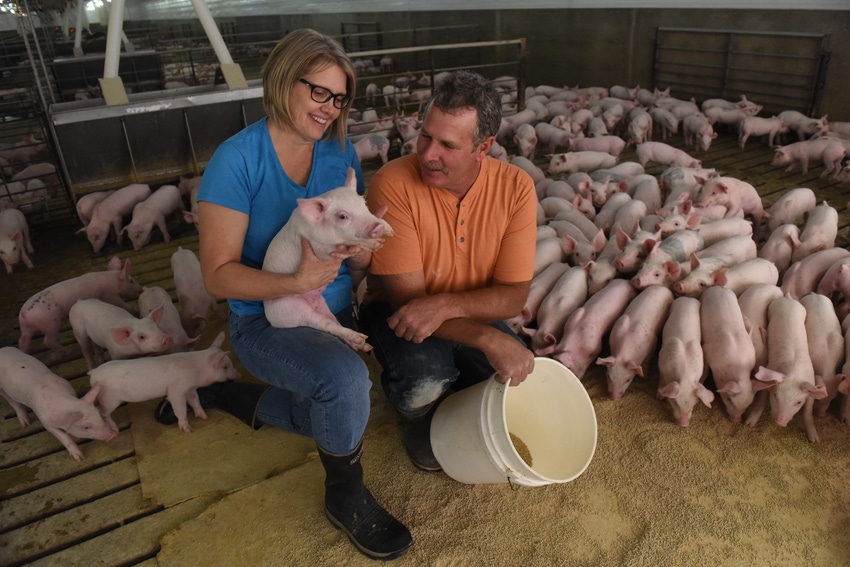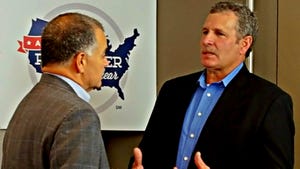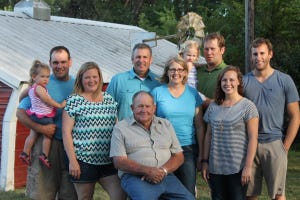Pig Farmer of the Year reunites consumers with pig caretakers
Following strict biosecurity measures does not mean closing the door to the public.


Max Armstrong, farm broadcaster, introduced America’s Pig Farmer of Year – Brad Greenway, to the world on Facebook Live event, kicking off the media tour.
Max Armstrong, farm broadcaster, introduced America’s Pig Farmer of Year – Brad Greenway, to the world on Facebook Live event, kicking off the media tour.High over the Magnificent Mile in Chicago, the world was introduced to this year’s America’s Pig Farmer of the Year — Brad Greenway. While the lights, cameras and microphones are all pointed toward Greenway, he just wants to reunite the consumer again with America’s compassionate pig caretakers. For Greenway, it is not about the scores of interviews or the title; it is about being the face of the pork industry and sharing the story.
“I am humbled and honored to be pig farmer of the year. I am very excited about it. There are so many people that are doing so many good things to get the message out. I will do all I can,” says Greenway.
Although the cyclical nature of the swine business can create its difficulties, Greenway says just getting the genuine farming story out is challenging. He recognizes that consumers receive information about farming from many sources and many times the farmers’ voices are missing. “Consumers just need to know that we are doing things right. That is why this is so important,” says Greenway.
Consumers often receive misinformation about what actually happens in the pig barns. Greenway firmly believes that efforts to keep pigs healthy and safe by imposing strict biosecurity measures also close the barns off to the world. He says, “When we shut the doors, I think we shut the public off.”
Over the years, Greenway has participated in consumer outreach programs such as Pork Checkoff’s Operation Main Street. He says, “The more and more presentations I give, the more I see the disconnect and the interest. We have to look at that as an opportunity.”
One area both farmers and consumers share is the concern over antibiotic use. On his farm, sick animals are treated and sometimes the use of antibiotics is necessary but not without consultations with Greenway's veterinarian first. He says, “We are analyzing with our veterinarian more often than ever. We are definitely backing off (antibiotic use), and it is not business, as usual, going forward. Healthy pigs mean safe pork.”
Still, the most important thing for Greenway is showing how much he cares for the pigs, planet and the consumer. He says, “Every day, whether I am in the barn or my employee or my wife, it is our ultimate goal to care for the pig. So when the pigs leave our farm, the consumers and public have confidence they are getting responsibly-raised pork.”
He continues, “It does come down to the We Care Principles. Taking care of the pigs, people and land are our first priorities.”
Brad Greenway, America's Pig Farmer of Year
Brad Greenway, America's Pig Farmer of YearPig Farmer of the Year
Greenway was named America’s Pig Farmer of the Year following a third-party audit of on-farm practices and conducting a series of written and oral interviews by subject-matter experts. He has achieved excellence in all aspects of pig farming, including animal care, environmental stewardship, employee work environment and outstanding community service.
“We are pleased to have Brad represent America’s pig farmers. He embodies the very best in pig farming,” says Jan Archer, National Pork Board president and a pig farmer from Goldsboro, N.C. “It’s important that we share with today’s consumers how we raise their food in an ethical and transparent way. Brad’s interest in sharing his farm’s story — and putting a face on today’s pig farming — will help us reach this goal.”
The panel of expert judges met in early September with the four finalists – Craig Andersen, Centerville, S.D.; Jarrod Bakker, Dike, Iowa; Greenway, Mitchell, S.D.; and Maria Mauer, Greensburg, Ind. Members of the panel were Robin Ganzert, president and CEO of American Humane; Kari Underly, a third-generation butcher, author and principal of Range Inc., a meat marketing and education firm; Justin Ransom, senior director, supply chain management at McDonald’s USA; Jodi Sterle, an associate professor of animal science at Iowa State University; and Keith Schoettmer, the 2015 America’s Pig Farmer of the Year.
As a judging panel member, Ganzert says, “As an animal lover and the leader of the country’s first national humane organization, I am honored to be a judge for America’s Pig Farmer of the Year. American Humane celebrates all those, including our nation’s farmers, who care for animals and work hard to ensure they are treated humanely. Today, more than ever, it is important not only to point out where progress is needed but to recognize when we get it right.”

Brad Greenway and his family on their farm near Mitchell, S.D.
Brad Greenway and his family on their farm near Mitchell, S.D.More from the Greenways
Greenway has always called South Dakota home only moving one mile from the farmstead where he grew up. He and his family continue the Greenway heritage, farming the land for almost 100 years. Growing up, agriculture was the norm with experience in raising crops along with pigs, beef and dairy cattle with his parents and three siblings. Similar to all farm kids, he has also spent some time in the show ring competing for the banner.
Greenway has always been naturally drawn to the pigs. He jokes, “maybe out of necessity” as his parents were busy milking cows. Despite the reason, the rich family farm experience has nurtured his passion for pig farming.
After earning a two-year degree at Mitchell Technical Institute, he joined his dad, Tom, on the farm as labor but since then has branched off and still enjoys the day-to-day collaborative work relationship, supporting each other’s farming enterprises.
Today, Brad proudly farms alongside his wife, Peggy. For more than 33 years, they have raised crops, livestock and children near Mitchell, S.D. Although Peggy and Brad’s children, Brent and Mandi, are now grown, married and pursuing other careers — engineer and medical doctor —, it is not unusual to see Brent lending a hand on the farm when time allows. Greenway’s granddaughter, Nora, is also a frequent visitor to farm, enjoying the sights and sounds even at a young age.
For the Greenways, variety is the spice of life with diverse commodities — pigs, 220 head of cattle, corn, soybeans, wheat and alfalfa — grown on the land. As a full-circle farm, the Greenways understand the hidden value of keeping it local. Grains grown on the Greenways’ land serve as the base feed ingredients to produce wholesome pork for the world while the animals provide valuable nutrients for the soil. He says, “When Peggy and I look at our farm, we think what is going to keep us sustainable in the future. It is about using manure from pigs as fertilizer and feeding my own crops back to the pigs. Every day we are doing what we can do for the environment and use fewer natural resources to produce more.”
Pigs have always been a big part of Greenway’s farming career. Nine years ago, the focus of the farrow-to-finish hog farm was revamped as he separated from the 50-50 partnership with his father. The extreme South Dakota weather made the task of raising pigs difficult, especially finishing pigs in outdoor lots with a deep-bedded hoop building. He openly admits, even though he did everything possible to provide clean, dry bedding and shelter, it kept him up at night worrying about those hogs exposed to blowing snow and harsh temperatures.
As their extra helping hands left for college, Peggy and Brad re-evaluated the hog farm and made changes. It was time to bring the hogs indoors to make them more comfortable. Two 2,400 wean-to-finish state-of-the-art facilities were built three years apart with the latest technology to control the living environment of the pigs year around. By expanding the livestock portion of the farm enterprise, the Greenways were able to employee a full-time person, Thomas Smith. Brad says “Having a great team at home with Thomas, Peggy, and Brent has allowed him to be able to take time away from the farm to advocate for pig farming and agriculture in general.”
At the same time, Greenway and 13 other Davison County farmers cooperatively invested in a sow farm, Bluestem Family Farms, managed by Pipestone Veterinary Services built on his father’s land. The sow farm supplies all the pigs for his wean-to-finish operation. He receives the pigs at three weeks of age to finish for pork, harvesting 10,000 head a year.
In between the construction of the finishing facilities, the Greenways also built a feed mill, grinding his own feed for the animals. The system is completely computerized, making it easy to adjust diets as needed and very conveniently located in the middle of two swine facilities. It simply puts him in control.
Being a good neighbor is a high priority for the Greenways. As a city girl, Peggy knows personally how disconnected the public is from the farm. Before any construction began, she was adamant about speaking with every neighbor about the activities on their farm. Peggy did not want them to read it in the papers as the proper permits were being filed. She wanted them to hear straight from Brad and herself.
The No. 1 priority for the Greenways, next to providing animals with excellent care, is the consumers’ confidence and the trust in the farm producing safe food. Being open about the activities on the farm is the best way to build that confidence, Greenway says.
Thoughts on the pork industry
Looking ahead, Greenway is very optimistic about the future of pork. Consumers around the globe enjoy U.S. pork. He says, “The blessing in our area is the new packing plants coming online. Many people are gearing up for that, and it is a bright spot.”
The domestic demand and consumption are strong, but it is necessary to grow the export market to keep the profits in the pig business. Greenway says, “There are a lot of countries that really love our product. When we get into them, it can be a double-edge sword because you can get too dependent on the export market.”
At the end of the day, all consumers need to trust the farmer to increase the consumption of pork. Joining Greenway on the first media tour is Chicago master butcher and author Kari Underly. Food service professionals like Underly play vital roles in connecting the farmer to the consumer. She says, “I think people skip the whole farm sometimes. They do not realize there are a lot of small farmers like Brad out there.”
Furthermore, Underly says many consumers are surprised by the science behind meat production. It is important to share all the technologies involved in raising pork.
The versatility of pork is its selling point. Pork is an excellent protein choice for consumers. It is adaptable and at an affordable price point for consumers, giving them many options — lean pork, local pork and it marinates well. Also, pork works well with the farm-to-table experience and the ability for chefs and food preparers to be creative. “Pork has that very nice price proposition to the consumer, and it is a really good, healthy protein,” notes Underly.
She urges all pig farmers to keep sharing and be candid. Underly recommends them to know your target consumer. Consumers are concerned about how the food is raised. She says, “I think this program is positive because it shows real farmers. As an ag community, we have done a good job of saying you can’t see what we are doing and I think it puts a cloud that does not need to be there. Consumers want transparency.”
Parting words
Greenway encourages all pig farmers to tell their stories and have more conversations with the public. He advises the average consumer does not want to know all the finite details about pork production. They just want to know who is raising the pigs and producing pork for their plates.
Greenway recalls a dialogue with a consumer after a presentation in Florida. He explains the consumer admitted she trusted him after seeing a video of his farm, but asked how she could trust all other pork producers. Although she did not know him before the presentation, just seeing inside his barn upped the trust level. He says, “They do not want the details. They just want to know you care about the animals.”
Actively participating in consumer conversation can be approached in many different ways. Love it or hate it, social media has its place in telling the real pig farming stories. He openly admits that is his wife’s specialty. He says just the little things shared on social media from inside the barns make a large impact.
Moreover, he says it is important not to overlook the young consumer. The Davison County Pork Council members participate in many consumer outreach programs throughout the year including an Ag in the Classroom event, allowing Brad to speak at a handful of grade schools. “We have to start sooner. They have to be exposed to what happens on the farm early,” Greenway says passionately.
For the next generation of pig farmers, Greenway says “There are opportunities out there. In our area, crop farmers have the land and are open to buildings being built on the land. If a person likes taking care of the pigs, production partnership is an option as a way to build equity and then turn to owning the pigs.” He says, “There are good people out there willing to help young people transition to full-time farming.”
Greenway is encouraged by young people asking his advice on ways to return to the farm. He acknowledges the industry needs young pig farmers to sustain its future.
“I am optimistic about this next generation coming back. They are more adapted to doing social media and taking a picture of their kids in the barns and on the combines. The next generation is going to get that message out so much faster than I ever did and definitely faster than my dad did. Going forward, that is a good thing,” Greenway concludes.
About the Author(s)
You May Also Like



